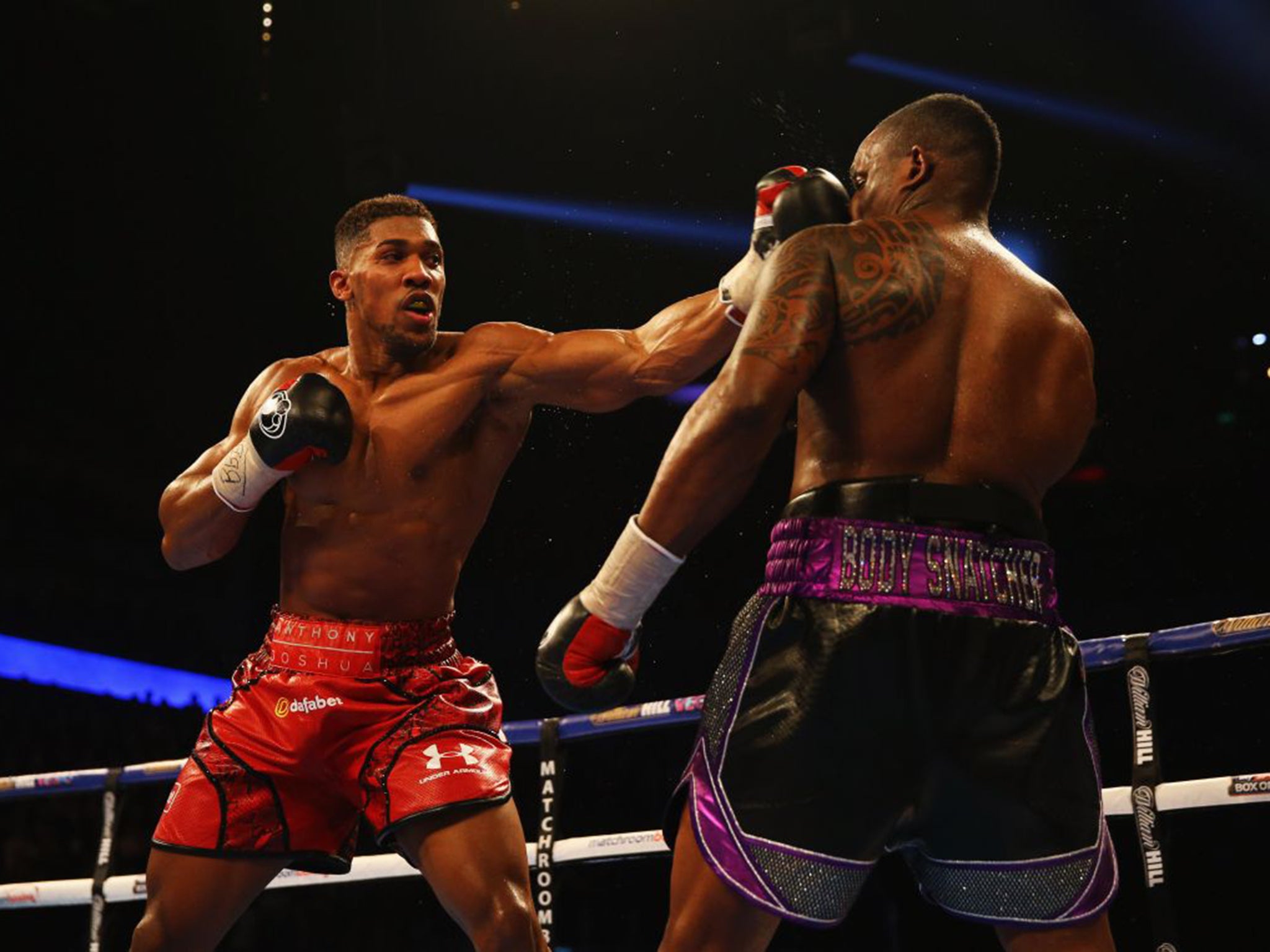Anthony Joshua should be free of the curse that turns Olympic gold into a heavyweight millstone
Can Anthony Joshua avoid adding his name to the list of failed Olympic boxers?

Your support helps us to tell the story
From reproductive rights to climate change to Big Tech, The Independent is on the ground when the story is developing. Whether it's investigating the financials of Elon Musk's pro-Trump PAC or producing our latest documentary, 'The A Word', which shines a light on the American women fighting for reproductive rights, we know how important it is to parse out the facts from the messaging.
At such a critical moment in US history, we need reporters on the ground. Your donation allows us to keep sending journalists to speak to both sides of the story.
The Independent is trusted by Americans across the entire political spectrum. And unlike many other quality news outlets, we choose not to lock Americans out of our reporting and analysis with paywalls. We believe quality journalism should be available to everyone, paid for by those who can afford it.
Your support makes all the difference.Anthony Joshua had his hand raised after the 2012 super-heavyweight final on the last evening of boxing at the London Olympics and he joined an elite but troubled club of fighters with ruined dreams, ruined faces and often ridiculous wealth.
If a boxer wins an Olympic gold medal there is simply no guarantee that the gloriously weighted prize will protect the fighter against failure or against crushing losses and shield the bearer from the sickening side of the brutal game.
Olympic heavyweight champion Ed “Big Ed” Sanders left the ring in 1952 intent on a professional career after chasing Sweden’s Ingemar Johansson all over the ring in the final. Sanders was relentless, a beast in the tournament, and Johansson had devised a cunning plan to beat the puncher: “I was going to run and tire him out – it never worked.” Johansson was disqualified for not fighting.
Sanders turned professional, was 6ft 4in, which was a freak height for a heavyweight in the Fifties, and was described as “soft-spoken and gentlemanly” in most contemporary fight reports. The professional heavyweight title situation at that time was farcical; Rocky Marciano was the champion and he was selective with fights and fought a series of smaller and older men before retiring unbeaten in 1955.
After a deal was reached with the US Navy, Sanders was allowed to turn professional in 1954 but died that year a day after being knocked out in a fight. He was 24 and remains the lost man of Olympic heavyweight boxing, a forgotten figure in a tragic tale. Sanders died without riches or fanfare, a long way short of where a gold medal is meant to take a heavyweight boxer.
Come 1957, the reigning Olympic champion was Peter Rademacher and in his very first professional fight he met Floyd Patterson for the heavyweight world title, in a twist that even Hollywood’s boldest would struggle to justify in film. I said the title situation was farcical in many ways in 1952. Well, by 1957 it was close to anarchy, with dangerous men being frozen out and crazy fights like Rademacher and Patterson somehow taking place.
Rademacher dropped Patterson in round two but was dropped himself a total of six times before he was rescued from the crazy plan in round six. It was the start of the end for Rademacher, who had the bravest and most foolish manager in history and who took too many beatings before calling it a day in 1962. However, he got out with his faculties intact, has raised millions for charity and, until recently, still rode his one-wheel bike in parades; he has been in over 500 parades, so he told me in 2012. “The only mistake I made in boxing was to knock down Patterson – it made him angry,” he said.
The raw statistics are not particularly encouraging for boxers who win the heavyweight division at the Olympics – since 1952 just five of the 16 gold medallists have turned professional and won the heavyweight championship. Not all of the failures have been as tragic as Sanders or as comically sad as Rademacher.
Lennox Lewis, George Foreman, Wladimir Klitschko all turned gold into millions and Joe Frazier turned gold into old-school glory when he beat Muhammad Ali at Madison Square Garden in the “Fight of the Century” in 1971. Frazier missed the wealth but retains a special place in the boxing register because of the sacrifices he made in a decade of brilliance.
The other winner of both titles is Alexander Povetkin, but the Russian former WBA champion occupies the murky territory that has existed for 10 years, where splintered belts are thrown like confetti across the soiled platform. Povetkin, by the way, should fight Joshua by the end of next year and not a second earlier.
Joshua is already free of the mad curses and, hopefully, going forward he will learn about patience from masters like Klitschko and Lewis, both men of immense class and skill. It is crucial he avoids having his name added to the list of failed Olympic boxers who occupy a special place in the lost and found from boxing history. Nobody wants another glorious failure.
Join our commenting forum
Join thought-provoking conversations, follow other Independent readers and see their replies
Comments